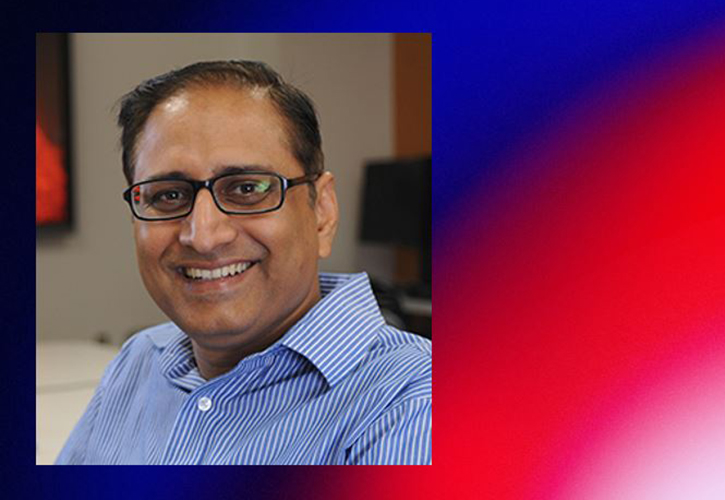College of Arts and Sciences Newsroom

University of Dayton Professor Umesh Haritashya honored with SOCHE Faculty Excellence Award for research into climate change, geological impacts
By Bridgett Dillenburger ’23
University of Dayton geologist Umesh Haritashya was recognized in August with a 2020-21 SOCHE Faculty Excellence Award for his contributions to understanding the relationship between climate change and natural disasters in alpine environments.
Haritashya’s research examines hazards such as landslides as they relate to glacial retreat and other climate changes in mountainous regions, particularly the Himalayas. He analyzes satellite images and field data to understand the increasing occurrences of these geologic events.
“Many of the studies that we work on cannot pinpoint when something will occur, but what we could do is try to understand which areas are prone to landslides and which areas will have a major impact if the infrastructures are not properly built,” said Haritashya, professor of geology and Mann Endowed Chair in the Sciences. “From a community standpoint, our research impacts the policy and decision-making that can have an impact on where the communities are settled and where the infrastructures are built.”
His team has received more than $3 million in research grants in the last 10 years, including augmentation funding of $55,000, $185,000 and $194,000 from NASA during summer 2021 to extend three research projects through 2022.
His research impacts policy and decision making in those regions. Understanding the hazard level of certain areas can help people plan and prepare for the possibility of being displaced.
Haritashya cites the example of a major debris slide in India in February that impacted the development of a downstream hydropower dam, as highlighted in a 2021 New York Times article that drew upon his expertise.
Haritashya said communication among geological researchers has benefited from technological advancements. He collaborates with researchers from around the world to share the constant flow of information being gathered.
The innovative use of advanced satellite technology and its capability to process large amounts of data using machine learning also contributes to around-the-clock data monitoring, enabling researchers to always be in operation. These processes have been useful in continuing research during the COVID-19 pandemic. However, direct observation, or “ground truth,” still remains a crucial component to the research.
Shuang-Ye Wu, professor and chair of the Department of Geology and Environmental Geosciences, praised Haritashya as an outstanding scientist doing highly impactful research, who uses his knowledge and expertise to teach a variety of exciting courses in the department.
“Dr. Haritashya is particularly passionate about training the next generation of geoscientists by involving students extensively in his research,” Wu said. “His mentoring has produced impressive results, leading to students presenting at national conferences, co-authoring academic papers and going to esteemed graduate programs.”
Haritashya’s research has direct connections to the courses he teaches. Being able to bring his work into the classroom and show students recent field research influences his classroom content. He hopes this will benefit students as they connect the textbook to real examples from the field.
“The courses that I teach are directly what I do in my research work, so I can bring the information to the classroom from a cutting-edge research project that is currently happening in the field,” Haritashya said. “Bringing my research and my colleagues’ research has helped my pedagogy as well as delivery and modification of the content wherever needed.”
Haritashya views the SOCHE award as a confirmation of the importance of his work. He said he is humbled to receive this award and is thankful for the nomination. Founded in 1967, the Southwestern Ohio Council for Higher Education is a consortium of colleges and universities in Ohio. University of Dayton faculty selected for the SOCHE Faculty Excellence Awards have been recognized by their colleagues for outstanding scholarship, teaching and service.
Haritashya said federal funding is essential to his research. He is also thankful for the contributions from his students, colleagues and other researchers.
Haritashya wants his research to not only solve unanswered scientific questions, but to also benefit global communities. While individuals in these areas directly observe the impacts of climate change on their lives and livelihoods, there is still a need for people outside of these regions to recognize the need to do more, especially policy and decision-makers.
“I hope this science boils down to a very basic local level where people living there benefit from the work that we do in some way shape or form,” Haritashya said.
For more information, visit the Department of Geology and Environmental Geosciences website.
